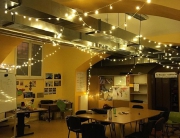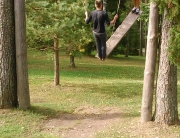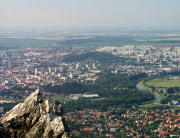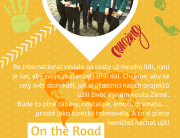Dear comrades, [1]
in the following moments you will learn about my Georgian experience and in the end I will give you my recipe how to make “international” Georgian meal. To deserve it you have to hear my serious story about my Georgian experience. Fasten your seat belts!
“A long time ago in a Caucasus galaxy far, far away….
At the beginning of November five students from the Czech Republic participated in the project called “Volunteering For a Peaceful Future” in a mountain resort in Bakuriani, Georgia. The entire project was organized by the civic association Be International, based in Brno, Czech Republic and the Georgian NGO International Center for Peace and Integration.
It was the first project of Be International funded by the Youth in Action programme which was implemented abroad. The project lasted seven days and brought together forty people from eight countries, from the EU and Eastern Europe and Central Asia: Poland, Czech Republic, Latvia, Georgia, Russia, Azerbaijan, Moldova and Lithuania. Although they were all coming from different regions, they shared a common legacy of post-soviet union experience and thus they were making a unique group of people with different backgrounds and passionate to get to know another culture.
This multinational group of youngsters learned how to develop their ideas of peace, use of voluntary for peace-building process and how to avoid the different levels of conflict by using the non-violence methods of communication. The non-formal dialogue about promoting solidarity and tolerance was followed by informal discussion about different kinds of international conflicts. Furthermore, the most exclusive part of this debate was personal contribution of all participants on the discussion on the current issues in their home countries. Hence, all participants from each country introduced their own themes which currently reflected situations in their countries, for example Poland (ultra-catholicism), Russia (multinationalism), Azerbaijan (Nagorno-Karabakh War), Moldova (Transnistria Territory) Georgia (Georgian – Southern Ossetia Conflict) etc.
In my humble opinion this debate led to really unique experience when everyone non-directly learned from each other and every human being could develop his or her own opinions about these themes. It remarkably contributed to my communication skills since it gave me the unique opportunity to discuss such sensitive topics with people which are personally involved in it and by whom I really enjoyed being accompanied. It also proved that some of these topics are highly neglected by Czech media and thus it made me passionate about seeking for more detailed international sources. On the other hand, I could openly chat and ask about those matters which are hardly officially available due to censorship, lack of sources and my poor Slavic language skills, except my mother tongue and Slovak language.
Every evening each group of nation had to introduce its own traditional meals, drinks, dances and cultural habits. One day you could watch some traditional Georgian dances, the other day you could taste Polish vodka and Polish krówki, Lithuanian candies, Azerbaijan pomegranates and tons of another food, candies and drinks from Eastern Europe and Central Caucasus. So it has been my first time in Georgia. I have heard a lot about this Caucasus country. However, the best way of soaking up Georgian spirit is get flight tickets, pack and gets stuck in Borispol airport. No way! Yep. Almost ten hours in the airport in the middle of nowhere!
Rule n.1. It does not matter where you got stuck; it matters with whom you got stuck.
It was at the beginning of November, it was snowing in Bakuriani, and it was chilly. But after all, the country of St. George deeply graved in my mind. It is a beautiful land full of breathtaking mountains, deserts, sea, warm and friendly people who are always pleased to talk to you can help you. What else do we need to be a happy? Peace!

When I get down to writing this essay I was thinking all day long how to describe my Georgian experience. What would be the most precise expression of my fourteen days in Georgia? So I went through my diary and read my notes. People, food, people, food and food and…delicious and so tasty. There is never bad choice when tasting Georgian food and wines. Khachapuri, lobiani, lobio, khinkali, guphta and kharcho, labda…etc. Of course, I got the the idea that this meal precisely describe my wonderful fourteen days in Georgia. What precisely is lobio? Lobio is a dish served in a clay pot filled with all kinds of different ingredients, for instance: stewed beans, ham, walnuts, onions, tomatoes, garlic, vegetables etc. In Georgia you can find many varieties of this soup…with different kinds of meats, vegetables. All this is served with mtchadi – Georgian toasted cornbread.

As I promised, here is my recipe for our “lobio”, to be honest, it is not a recipe it is just summary of these seven days in Georgia. It also the story of how 40 people met in a wonderful place and had a fabulous time together and maybe learned more than even thought about it. Read carefully!
Directions:
Put all nine nations (Czechs, Armenian, Poles, Azerbaijans, Moldavians, Russians, Lithuanians, Latvians, Georgians) into Bakuriani pan, bring to boil for seven days, mash with the local people and with 2 cups of field officers from European Union Monitoring Office for Southern Ossetia and Abkhazia. While waiting for pot to be boiled, play some energizers. Then shake it, shake it (baby!) & cook it over night. In the morning add Georgian black tea and spring Borjomi water (rescue boozers from hangover!). Add some chacha, and pour one glass of red Georgian wine Saperavi. Add herbs and say magic formula – HII-HAA-HUU. Serve hot with a smile on your face!
გემრიელად მიირთვი!
(Enjoy your meal)
Michal Kubáň
[1] You know it is hard to find right salutation to all of you participating in this project, but it would be difficult to find one word which could mean friend in all our eight languages. Therefore I think that to all intents and purposes a Slavic word ”comrade” could achieve this goal.


































Leave A Comment